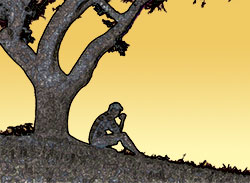‘Mental Health and Wholeness’ series will focus on help and hope for mind, body and spirit

(An illustration rendered from an orignal image by CNS photo and copyrighted by MaxPixel via Wikimedia Commons)
By Natalie Hoefer
At some point in life, most people can empathize with the psalm Christ called upon from the cross:
My God, my God, why have you abandoned me? Why so far from my call for help, from my cries of anguish? (Ps 22:2)
The state of mental health in the United States is at a critical point, even garnering national attention. In May, the White House released a statement noting, “It is clear that our country is facing an unprecedented mental health crisis impacting people of all ages.”
But what constitutes “mental health?”
The definition is broader than you might think. According to the Centers for Disease Control and Prevention (CDC),“Mental health includes our emotional, psychological and social well-being. It affects how we think, feel and act. It also helps determine how we handle stress, relate to others and make healthy choices.”
Causes range from external sources like life events and stress, to internal sources like body chemistry and genetics. And symptoms run the gamut from mild to chronic.
The statistics are staggering. According to the CDC, more than 20% of U.S. adults live with a mental condition, and the same is true for youths ages 13-18.
But numbers aren’t necessary to know the reality of the current mental health situation. Chances are you or someone you know is struggling in this area.
(Related stories: Caring for mental health ‘is just a good way to live’—and faith can help | Mental health resources in central and southern Indiana)
But there is help, from individual and group therapy to medication—even to federal funding. The same White House statement in May announced $200 million in assistance to address the issue. In Indiana, Senate Bill 1 went into effect on July 1, designating funding for a statewide crisis response system for mental health emergencies and establishing a general help line for non-emergency mental health support.
Just as important in mental health assistance—there is hope. From faith-based counselors to spiritual direction to the sacraments, the Catholic Church professes the essential connection between mind, body and spirit.
“Mental Health and Wholeness” is an occasional series that will look at five areas of mental health issues—in adults, marriages and families, teenagers, children and in the form of addiction—and how faith is a healing source interwoven throughout treatment, recovery and the pursuit of wholeness. A sixth article will address the role spiritual direction can play in the mind-body-soul connection.
Articles include input from Catholic faith-based counselors, insights from those who have suffered various forms of mental health issues, and thoughts from clergy and spiritual directors on the integral role of faith in addressing mental health as a part of healthy wholeness.
The hope of this series is to inform, but also to normalize the topic of mental health. To quote one of the Catholic counselors interviewed: “If we could just make mental wellness the standard, we’d do ourselves a huge favor.”
As St. Paul told the Thessalonians, “May the God of peace himself sanctify you entirely; and may your spirit and soul and body be kept sound” (1 Thes 5:23a).
(Those experiencing thoughts of suicide or a mental health or substance use crisis should call or text 988 to reach the 24/7 national Suicide & Crisis Lifeline. A list of Catholic-informed counselors can also be found at lnkiy.in/MentalHealthMinistry and lnkiy.in/CounselorList.) †
